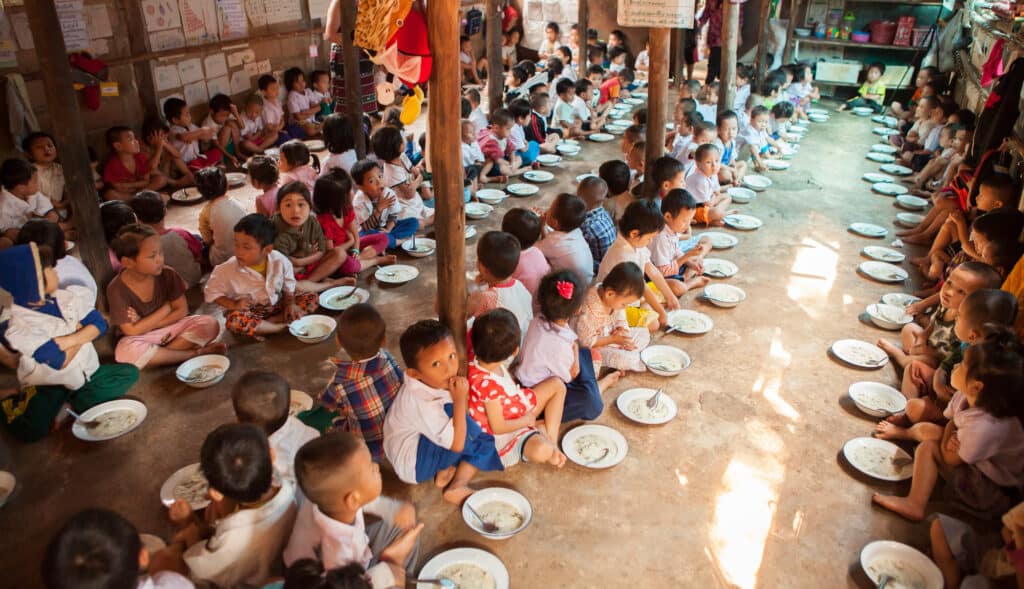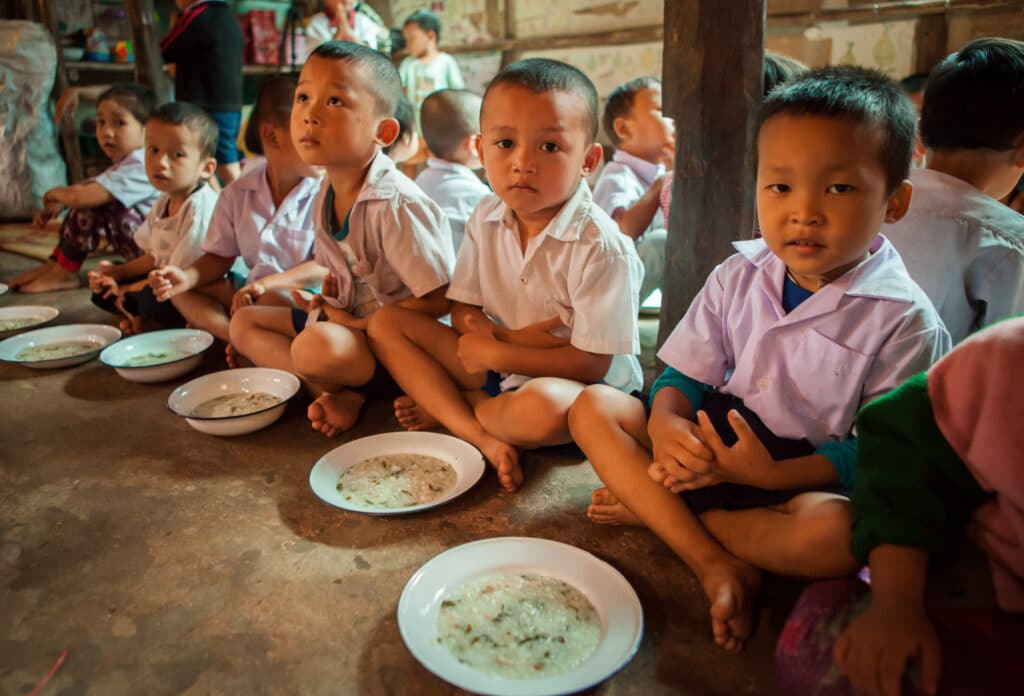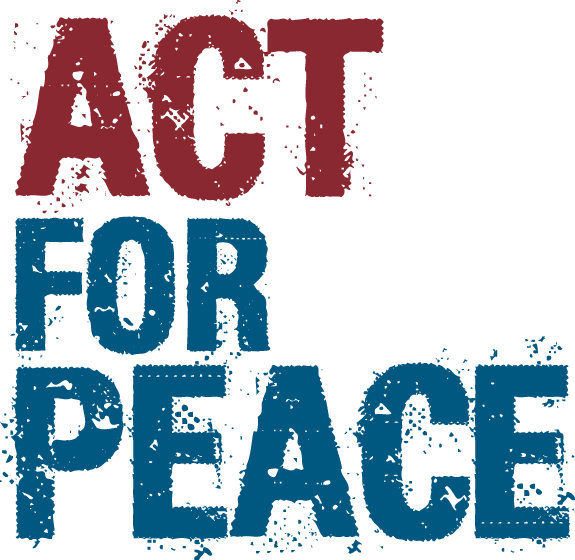In western Thailand, a sprawling population of refugees from Myanmar live in nine camps along the border with Myanmar. These highly functional refugee-led communities are not the result of a sudden outbreak of conflict. The camps are mostly home to families. Some have lived there for generations, raising children who were born in the camps and know no other reality.
These families have lived in the camps for decades after fleeing fighting between the military and ethnic armed groups – a protracted conflict that has been ongoing since Myanmar gained independence from Britain in 1948. Others arrived in more recent years, since the 2021 coup which saw the deadly conflict increase when the military seized power in 2021.
Over 108,000 refugees call the border camps home, but Thai government policies prevent them leaving the camps and from working in Thailand, leaving them entirely dependent on food aid for survival.

A refugee-led camp
Act for Peace partners with The Border Consortium (TBC) to support refugee-led management in the camps, through a program called Lead from Within. The program provides refugees with a dignified pathway to build their leadership skills and autonomy over the decisions that impact their lives.
Lead from Within focuses on supporting refugee-elected camp committees. They provide training, decision-making and leadership within the camps, as well as advocacy on local integration. The camp committee is a professional body of refugees that allows for self-governance, making decisions about what aid is needed and how it is distributed.
TBC, with the support of its partners, is the main provider of food, shelter and other support for the refugees from Myanmar living in the camps. But they are currently facing the very real prospect that food may run out.
TBC is a prime example of the tangible impact on operational capacity in the face of aid cuts and aid suspensions. The organisation is facing severe financial uncertainty due to the suspension of 55% of its overall budget, which primarily funds food aid for refugees. The United States Bureau of Population, Refugees, and Migration (PRM) funding has been suspended, leaving TBC with only a few weeks of cash for food supplies.
Refugees rely on food aid to survive
While Thailand hosts a significant number of refugees, they are not legally allowed to work.
“They’re wholly reliant on this external food aid,” says Maximillian Morch, TBC Advocacy, Communications and Reports Manager. “If there’s a disruption to that, it can cause a huge humanitarian problem.”
And we are only just beginning to see a real picture of the possible size of that humanitarian problem.
Timothy Moore, TBC’s Thailand Programme Director, says any change in the levels of support will have a “seismic” impact.
“Even a small change creates incredible uncertainty, anguish, and obviously, with food, within a month or two, we would see substantial immediate impacts on nutrition.”
That kind of impact is devastating, as TBC has made huge progress in improving nutrition in the camps. Rising chronic malnutrition will erase years of progress in preventing stunting and acute malnutrition.
Hunger will cause desperation
And when hunger sets in, there’s a risk that refugees will take desperate measures to try and feed their families.
Ner Kaw Htoo, the Karenni Refugee Committee Chairperson, confirms that refugees in the community are concerned about their future.
safety in exile
“If refugees don’t receive any more food, or the food support will be reduced, how will the refugees survive?”
“They cannot go out of the camps to work. For the refugees’ future, we have limited choices. We cannot go back to Myanmar and now resettlement is paused so we can’t go to a third country. If we have to stay in the camps without food or support, it will be very hard for us.”
~ Ner Kaw Htoo, the Karenni Refugee Committee Chairperson
In the Thailand camps, there is also a very real risk of the collapse of these refugee-led communities. In the self-managed camps, refugees provide governance, food distribution and education. As funding cuts force skilled and self-sufficient refugees to leave, camps will become even more fragile, leaving only the most vulnerable behind. Already, critical refugee-led health and education programs are shutting down, affecting thousands of children and jeopardising their futures.
Facing uncertainty
According to TBC Executive Director, Léon de Riedmatten, it’s extremely challenging to plan when faced with such huge uncertainty.
“We try to see where we still have some money available,” says Léon. “If it’s not day by day, it’s at least week by week.”
It’s easy for governments to paint aid as an unnecessary expense, but that narrative oversimplifies a much more complex picture.

The reality of Myanmar’s displacement crisis
UNHCR estimates that in 2025, there will be 1.5 million refugees from Myanmar and 4.3 million internally displaced people (IDPs). That’s a gigantic jump from 2024, in what was already a catastrophic displacement crisis, with 1.4 million refugees and 2.3 million IDPs. With the conflict surging, displacement has increased in Myanmar as well as flows across the border.
The intensifying conflict in Myanmar is likely to drive more refugees into Thailand, as food aid for displaced people inside Myanmar is being cut.
The need for additional funding
The reality is, TBC is facing a huge funding shortage. From April to June 2025, they will only be able to maintain food support for just 20% of the population across the nine refugee camps in Thailand. But during that period, they will need to cut food rations drastically for the remainder of the 80% of refugees in the camps.
They call on supporters around the world to continue advocacy efforts to highlight the consequences of cutting refugee assistance.
TBC urgently needs financial aid to continue food distribution in the camps and prevent a broader humanitarian disaster. While global humanitarian funding is shrinking, Australian supporters can play a crucial role in bridging funding gaps.
TBC staff remain dedicated and resilient, but the situation is precarious. Without immediate support, thousands of refugees may face hunger, further displacement, and long-term harm.
Please join us in acting for peace.
How you can help
Advocate
Join us in advocating for our government to do more for people who need our help the most. Write to you MP voicing your support for Australian Aid (by clicking Advocate button below).
Spread the word to your friends and community and get them to do the same.
Give
Support our local partners to continue providing life saving humanitarian programs by making a donation.
Your gifts will provide them with vital support to continue providing humanitarian programs.
Pray
Please pray for a return of empathy for humankind. Pray for the communities affected by aid cuts and for the humanitarian workers who have lost their jobs.
Pray for the future of humanitarian programs and for sustainable funding.
